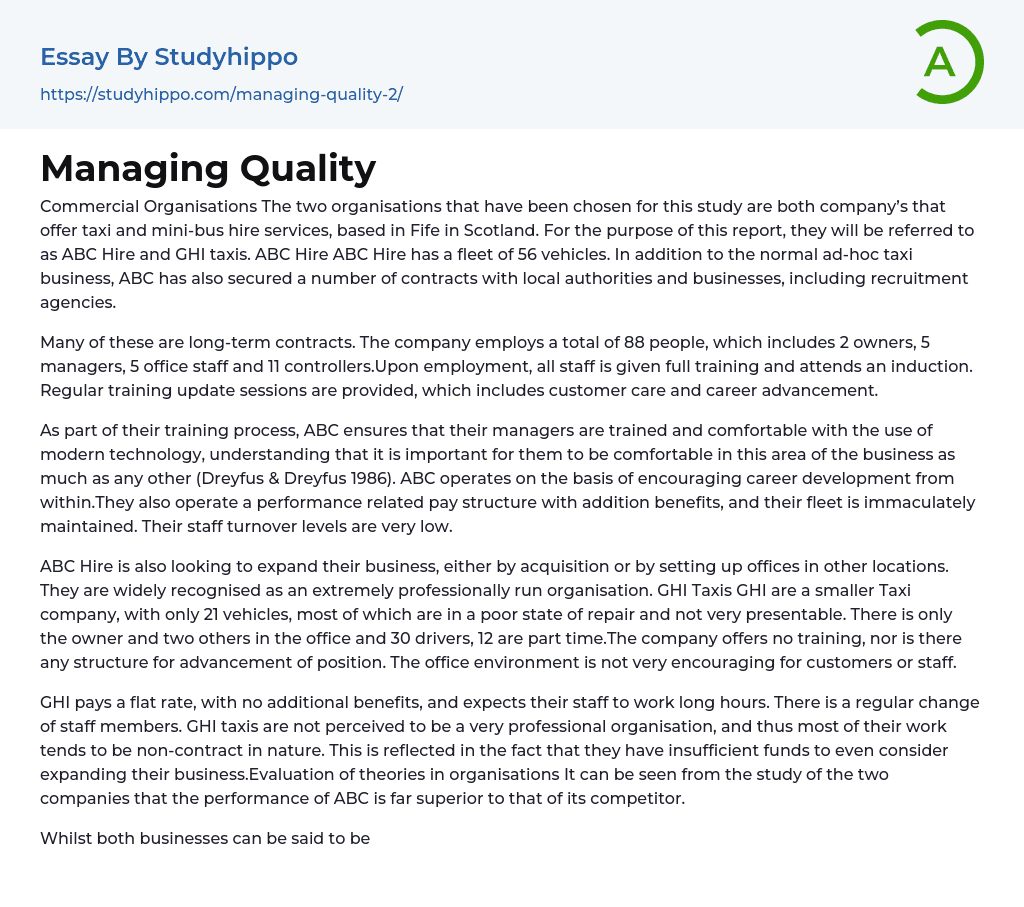This study focuses on two commercial organizations in Fife, Scotland that provide taxi and mini-bus rental services. The companies are referred to as ABC Hire and GHI taxis throughout the report. ABC Hire has a fleet of 56 vehicles and offers both regular taxi services as well as contracted services for local authorities and businesses, such as recruitment agencies.
Comprising 2 owners, 5 managers, 5 office staff, and 11 controllers, the company's workforce of 88 people engages in several extended agreements. All personnel undergo induction and comprehensive preparation upon hiring, followed by periodic training sessions for customer service and career development.
ABC places great emphasis on the importance of modern technology training for their managers as part of their overall training program. They believe that being proficient in this area is just as crucial as any other aspect of
...their business (Dreyfus ; Dreyfus 1986). Additionally, ABC fosters career advancement within the company and implements a performance-based salary system with supplementary perks. Their fleet is also maintained to impeccable standards, and they have achieved exceptionally low turnover rates for their staff.
ABC Hire is seeking to grow their business through either acquiring other companies or establishing additional offices. They have gained a reputation as a highly professional organization. In contrast, GHI Taxis is a smaller taxi company consisting of 21 vehicles, many of which are in subpar condition. The company only has one owner and two additional staff members working in the office, and a total of 30 drivers, 12 of whom work part-time. There is no provision for training or opportunities for career advancement, and the office atmosphere is not conducive to fostering positive relationships wit
customers or employees.
GHI operates with a fixed wage and no extra perks, while requiring extended working hours and experiencing a revolving door of employees. Their taxi services are not considered highly professional, resulting in a majority of non-contractual work. Insufficient funds prevent them from potential business expansion. Comparatively, ABC's performance greatly surpasses their competitor based on the study of both companies' organizational theories.
Although both businesses are satisfying the first level of Maslow's theory by providing basic needs, ABC stands out because they have expanded their staff motivation practices to include other levels of the Maslow pyramid. This includes creating a team-based organization, providing job security, and creating an environment where staff can pursue their goals. Additionally, ABC has successfully focused on quality, which has resulted in positive customer feedback and increased business value (Dale Barrie 2003). In contrast, while GHI may be satisfying basic needs of their staff, their precarious business position and treatment of staff indicate that levels two through four of the Maslow pyramid are not being met. GHI employees also lack career advancement opportunities. Therefore, it is unlikely that individuals seeking to pursue their goals in their working life would find GHI's work environment suitable. In conclusion, the research shows that Maslow's "hierarchy of needs" theory is practical and relevant in a business context.
If employees are in an environment that supports their needs, they will be motivated and perform at their best. Additionally, if a company focuses on quality management, they can achieve their objectives of expanding their customer base and business growth. ABC has demonstrated success in establishing a work culture that inspires and incentivizes their employees, while also delivering high
levels of customer care and quality that attract revenue and clients. Unless GHI adopts these same principles and implements them into their business model, it is probable that they will not succeed.
At the heart of this reference list are two sources: "Managing Quality" by G. Barrie Dale (2003) published by Blackwell Publishing Ltd. in the UK, and writings by H. Dreyfus.
L. and Dreyfus, S. E. published this in 1986.
Mind over machine: The power of human intuition and expertise in the era of the computer. Basil Blackwell. Oxford. UK. Herzberg, Frederick (1993). Motivation to Work.
The author of the book "U. S. Maslow" is Abraham H. Maslow, and it was published by Transaction Publishers. The book is also credited to R. Lowry and R. J. Lowry. This information is enclosed in HTML paragraph tags.The book "Toward a Psychology of Being," 3rd Edition, published by John Wiley & Sons in the U.S. and Canada, was edited in 1998.
Abraham H. Maslow's book "Maslow on Management" was published in 1998 by John Wiley ; Sons Inc.
David C. McClelland's book "Human Motivation" is relevant in both the United States and Canada.
The location of Cambridge University Press is in Cambridge, UK.
- Abnormal Psychology essays
- Abraham Maslow essays
- Attachment Theory essays
- Authority essays
- Behaviorism essays
- Classical Conditioning essays
- Cognitive Psychology essays
- Counseling essays
- Developmental Psychology essays
- Educational Psychology essays
- Erik Erikson essays
- Family Therapy essays
- Jean Piaget essays
- Maslow's Hierarchy Of Needs essays
- Mental Health essays
- Operant Conditioning essays
- Personality Psychology essays
- Positive Psychology essays
- Psychoanalysis essays
- Psychotherapy essays
- Sigmund Freud essays
- Social Psychology essays
- Stanford Prison Experiment essays
- Supersize Me essays
- Bias essays
- Big Five Personality Traits essays
- Body Image essays
- Mind essays
- Motivation essays
- Phobias essays
- Thought essays
- Code of Ethics essays
- Conflict essays
- Dress Code essays
- Human Resources essays
- Organizational Behavior essays
- Performance essays
- Recruitment essays
- Safety essays
- Qualities essays




